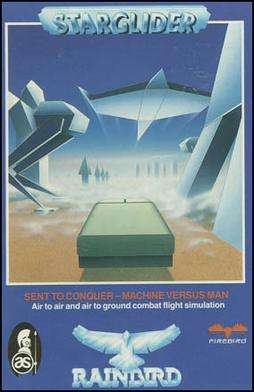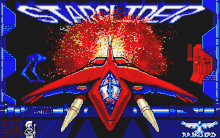Starglider
Starglider is a 3D video game published in 1986 by Rainbird. It was developed by Jez San under his company name Argonaut Software. The game is a fast-moving, first-person combat flight simulator, rendered with colourful wireframe vector graphics inspired by San's love of the 1983 Atari coin-op Star Wars.[1]
| Starglider | |
|---|---|
 Cover art | |
| Developer(s) | Argonaut Software |
| Publisher(s) | Rainbird |
| Designer(s) | Jez San Rick Clucas |
| Platform(s) | Amiga, Atari ST, Amstrad CPC, Amstrad PCW, Apple II, ZX Spectrum, MS-DOS, Commodore 64 |
| Release | 1986: Atari ST 1987: others |
| Genre(s) | Space flight simulator |
| Mode(s) | Single-player |
Starglider was originally developed for the 16-bit Amiga and Atari ST. Rainbird commissioned Realtime Games to produce 8-bit versions for the Amstrad CPC, Amstrad PCW, and ZX Spectrum (128K, with a cut-down 48K version without sampled speech or special missions), and also for the IBM-compatible PC running in CGA. Solid Images were commissioned to produce versions for the Commodore 64 and Apple IIGS.
It was followed in 1988 by a sequel, Starglider 2, which uses filled-polygon graphics. The series inspired Argonaut to partner with Nintendo in creating the Super FX chip in order to power the StarFox series of hit games.
Story
The game takes over the surface of the occupied planet Novenia, and it is the player's goal to rid the world of the mechanised Egron invaders.

Starglider was packaged with a sci-fi novella by James Follett, describing the game's background story, in which the Egrons effortlessly blitz Novenia despite the planet possessing a previously impenetrable network of utterly deadly defense satellites. The Egrons defeat the system by disguising their battleships as a flock of intergalactic migratory birds, the Stargliders. The defense satellites had been programmed not to fire on these birds (which migrated between planets regularly) and hence did not recognise the Egron battleships as enemies, allowing the Egrons to reach the surface unopposed. The player pilots the only existing example of a prototype fighter craft, initially armed only with lasers, as the TV-guided missiles require an enormous amount of energy to launch and control, which can only be gained by induction as the craft skims over areas with high-tension power conduits.
Audio
Most versions contain sampled speech from Rainbird employee Clare Edgeley.[1]
The Amiga version has title music by Dave Lowe using digitized samples as instrument sounds, predating tracker music. The Atari ST and Amiga versions also have about 15-second long song—a single PCM sound file—with real vocals and synthesizers. A male voice sings: "Starglider ... from Rainbird".
Reception
Starglider was Firebird's third best-selling Commodore game as of late 1987.[2] COMPUTE! called it "a visually smooth concoction that is so realistic in its feel that you'll duck and squirm in your seat", especially praising the Atari ST version's graphics and sound.[3] The game won the award for Game Of The Year 1986 in Crash.[4]
Legacy
Starglider spawned a sequel, Starglider 2. The series inspired Argonaut Software to partner with Nintendo in creating the Super FX enhancment chip for Super NES in order to enable the StarFox series.
References
- "Starglider - Rainbird". Birdsanctuary.co.uk. Retrieved 7 July 2018.
- Ferrell, Keith (December 1987). "The Commodore Games That Live On And On". COMPUTE!'s Gazette. pp. 18–22. Retrieved 24 January 2015.
- Eddy, Andy (May 1987). "Starglider". COMPUTE!. p. 46. Retrieved 9 November 2013.
- "CRASH 38 - Readers' Awards". Crashonline.org.uk. Retrieved 7 July 2018.
External links
- Starglider at Atari Mania
- Starglider at Lemon Amiga
- Starglider at SpectrumComputing.co.uk
- Images of Starglider package, manual and screenshots at C64Sets.com
- Starglider at MobyGames